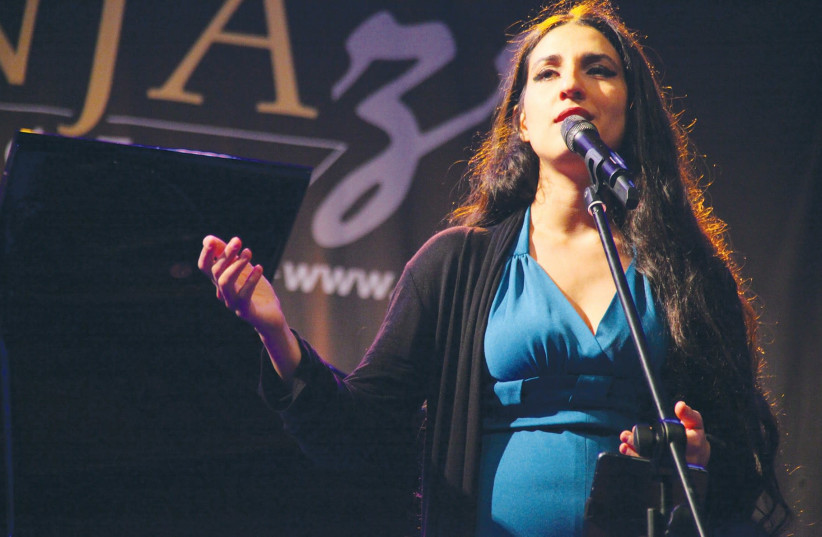It took Noam “Nani” Vazana a while to find her root bearings but she eventually got there. Not that she had exactly been sitting around twiddling her thumbs.
The 39-year-old Amsterdam-resident Israeli singer-songwriter has been very active on the music scene for some years now, performing across the globe and putting out four solo albums in the process. The latest, Ladino-based Ke Haber (What’s New), came out a couple of months or so ago.
In many ways Vazana is the epitome of the wandering Jew. She left her native Jerusalem for the Netherlands 13 years ago and has been wending her creative way along all kinds of cultural and musical pathways in the interim. She studied classical piano and trombone, gradually segueing into the worlds of jazz and pop, before finally making her way “back home” with her third release, Andalusian Brew, and now Ke Haber.
Vazana confesses to having the odd ulterior motive for delving into the sumptuous sonic and textural textures of Ladino, her roots language that was spoken and – crucially – sung by her grandmother. “Ladino is also an endangered language and I want to help to keep it alive,” she says. “There is also something fundamentally matriarchal about it.”
It was on a trip to Morocco, around six years ago, when Vazana encountered a powerful light bulb moment.

“I was invited to perform at the jazz festival in Tangier. It was very moving to be there,” she recalls, adding that she was determined to make the trip more than just a musical foray. “I thought, it was my first time in Morocco and it was a sort of roots odyssey. I went to Fes, where my grandmother came from, and there, on the street, I heard people singing in Ladino,” she exclaims. “There they were, on the street, in the most authentic way possible, people just singing together, in Ladino!”
Suddenly her personal and artistic route forward became crystal clear. “When I heard them singing, I got an idea of how people really lived back then, during my grandmother’s time in Morocco. That really played on my heart.”
It also brought back memories of the few short years she spent with her antecedent. “My grandmother died when I was 12, and she was ill for the last few years. But I remember, when I was four or five years old, I sat with her in the kitchen and, while we peeled beans, she sang Ladino songs.”
It was a powerful childhood experience that was to prove to be a formative passage of time, which, years later, was to point the way forward for Vazana. “I didn’t remember the exact words of the songs she sang, but I remembered the tunes.”
That image sat in Vazana’s memory banks until she made it to Morocco. “I didn’t hear Ladino songs for many years. There was a very big time gap, which is why it was such a powerful occurrence for me when I heard those people singing in Fes.”
The touch paper had been well and truly ignited although it took a little longer for the familial-fed musical rocket to take off. The song Vazana recalls so clearly from that kitchen session with her grandma was “Los Guisados De La Berenjena” (“The Eggplant Stews”), which found its way onto Andalusian Brew, which came out in 2018.
It had been a rocky road – she says her Moroccan-born father forbade his offspring from speaking Ladino at home – but she got there. “My father fled Morocco, and he wanted to leave the bad past behind him.”
Now there was no stopping her, albeit after a slowish start, and even though her hands on Ladino magical mystery tour began as a sort of afterthought. “I didn’t think, right away, that I’d do a Ladino album. I thought it was interesting and I started looking for all sorts of Ladino songs on the Internet, to see what it was all about.”
Vazana put her voice where her heart was, for the first time, at the Israeli Embassy in the Netherlands when she was invited to perform there.
“Before the show we started jamming, and thinking about what we should play when we suddenly came up with the idea of doing a Ladino song,” she explains. And so it came to be. “It was very powerful and after the show, the ambassador came up to me and asked if we did other stuff in Ladino.”
Fast forward a couple of years, with plenty of Ladino musical research undertaken in the interim, Vazana made a spur-of-the-moment decision which changed everything.
“I was about to go into a recording studio, with a string quartet, to record my own songs in English. One week beforehand I thought, stop, something here isn’t quite right, and I decided to make a Ladino album instead.” Just like that.
And so Andalusian Brew came to be, and now Ke Haber. The latest offering is an intriguing, wide-ranging mix of mostly Ladino numbers, with some Turkish seasoning, principally on the sensually-packed “Çok Seni Severim” (“I Love You Too Much”), which fuses with a children’s song in Ladino curiously called “Si Verias a la Rana,” which translates as “If You Would See the Frog.”
“I felt that having some Turkish on the record was apt because the largest Ladino-speaking community in the world is in Turkey, and they even have the only Ladino newspaper in the world there,” Vazana notes. “I want the language to survive, and I want the music to thrive, not as an ancient historical form but as something vibrant and contemporary”
Listening to Ke Haber can certainly help in that regard. Vazana is also hoping to perform some shows here sometime this year. Can’t wait.
For more information: https://nanimusic.com/home/
